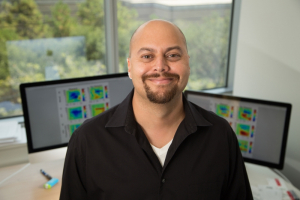If it has to do with the brain, Associate Professor of biomedical engineering Joe Francis’ neurons are crackling. While he continues teaching robots to sense what humans want through brain research, he’s just published a paper in the Journal of Neural Engineering where he shares his ideas to restore the lost sense of touch by electrical stimulation of the central nervous system.
“We want people to feel whole whether or not they have their limbs,” said Francis. “If you’re paralyzed, your limb being there doesn’t mean that much to you. It’s just something that needs to be moved along with you. Whereas, if we can let your brain control it again and let you feel it again, just making the person whole is really what it’s all about.”
Amazingly, he knows how it can be done.
His study of touch and brain waves has proved that he can stimulate the brain and imitate the sense of touch, opening the door for a new era in prosthetic integration. He and several colleagues wrote an article, “Eliciting naturalistic cortical responses with a sensory prosthesis via optimized microstimulation,” published in the July 2016 edition of the Journal of Neural Engineering.
It’s the first time this kind of work has been done, where the electrical stimulation is optimized to generate brain responses as close to natural as possible. What also sets the work apart is that it assumes little, other than the concept that what we feel is based on what our brain activity looks like. Similar sensory research has involved measuring walking and the sensory nerve’s responses, taking that activity pattern and assuming the stimulation pattern to the same nerve will evoke the same response, “which just isn’t true,” said Francis.
Francis and his team took a much different approach. They undertook brain mapping and began touching different parts of subjects’ hands. If a certain part of a finger is touched, it connects to a certain part of the brain’s thalamus and that information flows up to the brain’s cortex. If a different part of the digit is touched, the sensation moves up to a different spot.
“We put electrodes in the thalamus and cortex and touched the hand to see how the activity flows through the thalamus and to the cortex,” said Francis. “Then we stimulated the thalamic electrodes randomly and formed a mathematical model to predict the downstream cortical responses.”
Next, after completing what Francis calls “a bunch of mathematical magic,” his team electrically stimulates the brain to recreate responses that look the same as touch.
When the research plays itself out, Francis envisions sensors inside either people’s limbs or prosthetic limbs so that when a patient touches an object, sensory information will be transmitted directly to the user’s brain as if they were feeling something with their own hand.
But wait, there’s more
A lot more. Francis’ research in understanding the inner workings of the brain has led him to bypassing broken brain regions. That could be groundbreaking for stroke victims.
“The person will have to relearn to some extent, but this should be a huge advance in being able to input information into the nervous system,” said Francis.
For instance, the brain of a stroke victim unable to use his hand could be bypassed one day, and his hand could become usable by reconnecting the brain to another area. He’s published that work, too.
Even though he says it’s a coincidence, it’s no wonder Francis’ office is on the fourth floor of the University Eye Institute at UH. One day he’d like to restore vision to those who cannot see. In his world, sensory brain research is a generalized way of controlling the nervous system. “If you know what you want that response to be and you can give us input to that region, we should be able to make it happen,” he said.
The world of restoring the sense of touch and other human senses is the world that makes sense to Joe Francis.
